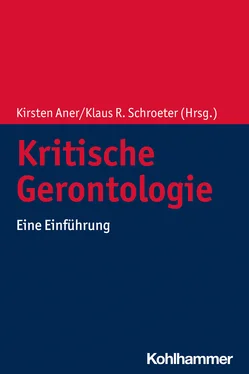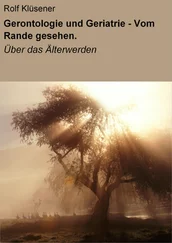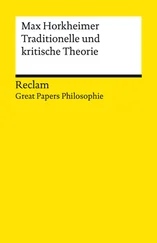Estes, C., Wallace, S. P., Linkins, K. W. & Binney, E. A. (2001c). The Medicalization and Commodification of Aging and the Privatization and Rationalization of Old Age Policy. In C. Estes et al. (Hrsg.), Social policy & aging: A critical perspective (S. 45–60). Thousand Oaks: Sage.
Ferraro, K. F. (2006). Imagining the Disciplinary Advancement of Gerontology: Whither the Tipping Point? The Gerontologist, 46(5), 571–573.
Ferraro, K. F. (2018). The Gerontological Imagination. An Integrative Paradigm of Aging. New York: Oxford University Press.
Gadow, S. A. (1983). Toward a critical gerontology: curriculum design in philosophy and aging. Gerontology and Geriatrics Education, 4(1), 67–74.
Gouldner, A. W. (1968). The Sociologist as Partisan: Sociology and the Welfare State. The American Sociologist, 3(2), 103–116.
Gubrium, J. F. (1993). Voice and context in a new Gerontology. In Th. R. Cole, W. A. Achenbaum, P. Jakobi & R. Kastenbaum (Hrsg.), Voices and visions of aging. Toward a critical gerontology (S. 46–63). New York: Springer.
Gubrium, J. F. (1995). Voice, Context, and Narrative in Aging Research. Canadian Journal on Aging, 14(S1), 68–81.
Guillemard, A.-M. (1977). A Critical Analysis of Governmental Policies on Aging from a Marxist Sociological Perspective: The Case of France. Paris: Centre for Study of Social Movements.
Guillemard, A.-M. (Hrsg.). (1983). Old age and the welfare state. Beverly Hills: Sage.
Holstein, M. B. & Minkler, M. (2007). Critical gerontology: reflections for the 21st century. In M. Bernard & Th. Scharf (Hrsg.), Critical Perspectives on Ageing Societies (S. 13–26). Bristol: Policy Press.
Jamieson, A. & Victor, Ch. (1997). Theory and concepts in social gerontology. In A. Jamieson, S. Harper & Ch. Victor (Hrsg.), Critical approaches to ageing and later life (S. 175–187). Milton Kenynes: Open University Press.
Katz, S. (1996). Disciplining old age: The formation of gerontological knowledge. Charlottesville, NC, London: University Press of Virginia.
Katz, S. (2000). Busy Bodies: Activity, aging, and the management of everyday life. Journal of Aging Studies, 14(2), 135–152.
Katz, S. (2003). Critical gerontological theory: Intellectual fieldwork and the nomadic life of ideas. In S. Biggs, A. Lowenstein & J. Hendricks (Hrsg.), The need for theory: Critical approaches to social gerontology (S. 15–31). Amityville, NY: Baywood.
Katz, S. (2005). Cultural Aging. Life Course, Lifestyle, and Senior Worlds. Peterborough, Ont.: Broadview.
Katz, S. (2014). What is Age Studies? Age, Culture, Humanities, 1, 17–23.
Katz, S. (2015). Five eye-openers in my life of critical gerontology. International Journal of Ageing and Later Life, 10(1), 21–34.
Kenyon, G. M., Clark, Ph. & Vries, B. de (Hrsg.). (2001). Narrative Gerontology. Theory, Research, and Practice. New York, NY: Springer.
King, N. & Calasanti, T. (2006). Empowering the Old: Critical Gerontology and Anti-Aging in a Global Context. In J. Baars, D. Dannefer, Ch. Phillipson & A. Walker (Hrsg.). Aging, globalization, and inequality. The new critical gerontology (S. 139–157). Amityville, NY: Baywood.
Kohli, M. (1988). Ageing as a challenge for sociological theory. Ageing and Society 8(4), 367–394.
Lynott, R. & Lynott, P. P. (2002). Critical gerontology. In D. J. Ekerdt (Hrsg.), Encyclopedia of Aging, Vol. 1 (S. 301–307). New York u. a.: Gale.
Marshall, V. (2009). What is new about critical gerontology? Ageing and Society, 29(4), 651–653.
Marshall, V. W. & Tindale, J. A. (1978). Notes for a radical gerontology. International Journal of Aging and Human Development, 9(2), 163–175.
Marx, K. ([1845] 1978). Thesen über Feuerbach. In K. Marx & F. Engels, Werke Bd. 3: Die deutsche Ideologie. Kritik der neuesten deutschen Philosophie in ihren Repräsentanten Feuerbach, B. Bauer und Stirner, und des deutschen Sozialismus in seinen verschiedenen Propheten (S. 5–7). Berlin: Dietz.
Minkler, M. (1996). Critical perspectives on ageing: new challenges for gerontology. Ageing and Society, 16(4), 467–487.
Minkler, M. & Estes, C. L. (Hrsg.). (1984). Readings in the political economy of aging. Amityville, NY: Baywood.
Minkler, M. & Estes, C. L. (Hrsg.). (1991). Critical perspectives on aging: the political and moral economy of growing old. Amityville, NY: Baywood.
Moody, H. R. (1988a). Abundance of Life: Human Development Policies for an Aging Society. New York: Columbia University Press.
Moody, H. R. (1988b). Toward a critical gerontology: The contribution of the humanities to theories of aging. In J. E. Birren & V. L. Bengtson (Hrsg.), Emergent theories of aging (S. 19–40). New York: Springer.
Moody, H. R. (1993). Overview: What is Critical Gerontology and Why is It Important? In Th. Cole, W. A. Achenbaum, P. Jakobi & R. Kastenbaum (Hrsg.), Voices and visions of aging: Toward a critical gerontology (S. XV–XLI). New York: Springer.
Moody, H. R. (2010). The New Ageing Enterprise. In D. Dannefer & Ch. Phillipson (Hrsg.), The SAGE Handbook of Social Gerontology (S. 483–494). Los Angeles u. a.: Sage.
Moody, H. R. & Sasser, J. R. (2018). Critical Questions for Critical Gerontology (and Critical Gerontologists). In Ch. Wellin (Hrsg.), Critical Gerontology Comes of Age. Advances in Research and Theory for a New Century (S. 35–45). New York: Taylor & Francis.
Myles, J. (1980). The Aged, the State, and the Structure of Inequality. In J. Harp & J. Hofley (Hrsg.), Structural Inequality in Canada (S. 317–342). Toronto: Prentice Hall.
Myles, J. (1984). Old age in the welfare state: The political economy of public pensions. Boston: Little, Brown.
Park, H. W. (2008). Edmund Vincent Cowdry and the Making of Gerontology as a Multidisciplinary Scientific Field in the United States. Journal of the History of Biology, 41(3), 529–572. DOI 10.1007/s10739-008-9152-1.
Phillipson, Ch. (1982). Capitalism and the construction of old age. London: Macmillan.
Phillipson, Ch. (1998). Reconstructing old age: New agendas in social theory and practise. London, Thousand Oaks: Sage.
Phillipson, Ch. & Walker, A. (Hrsg.). (1986). Ageing and social policy: A critical assessment. Aldershot, Brookfield: Gower.
Phillipson, Ch. & Walker, A. (1987). The case for a critical gerontology. In S. Di Gregorio (Hrsg.), Social gerontology: new directions (S. 1–15). London: Croom Helm.
Pollak, O. ([1948] 1993). Social Adjustment in Old Age: A Research Planning Report. Sociological Practice, 11(1), Art. 5. Zugriff am 18.05.2021 unter http://digitalcommons.wayne.edu/socprac/vol11/iss1/5.
Quadagno, J. (1984). Welfare capitalism and the social security act of 1935. American Sociological Review, 49, 632–647.
Quadagno, J. (1988). The transformation of old age security: Class and politics in the American welfare state. Chicago: University of Chicago Press.
Ruth, J.-E. & Kenyon, G. (1996). Biography in adult development and aging. In J. E. Birren, G. Kenyon, J.-E. Ruth, J. J. F. Schroots & T. Svensson (Hrsg.), Aging and Biography: Explorations in Adult Development (S. 1–20). New York: Springer.
Ray, R. E. (2008). Foreword: Coming of age in critical gerontology. Journal of Aging Studies, 22(2), 97–100.
Saake, I. (2002). Wenig Neues vom Alter: Ein systemtheoretischer Ausweg aus gerontologischen Denkschleifen. In U. Dallinger & K. R. Schroeter (Hrsg.), Theoretische Beiträge zur Alternssoziologie (S. 275–296). Opladen: Leske + Budrich.
Schroeter, K. R. (2000a). Alter(n) in Figurationen – Figurative Felder im Alter. In G. M. Backes (Hrsg.), Soziologie und Alter(n) (S. 109–138). Opladen: Leske + Budrich.
Schroeter, K. R. (2000b). Die Lebenslage älterer Menschen im Spannungsfeld zwischen ›Später Freiheit‹ und ,sozialer Disziplinierung‹. In G. M. Backes & W. Clemens (Hrsg.), Lebenslagen im Alter (S. 31–52). Opladen: Leske + Budrich.
Читать дальше










